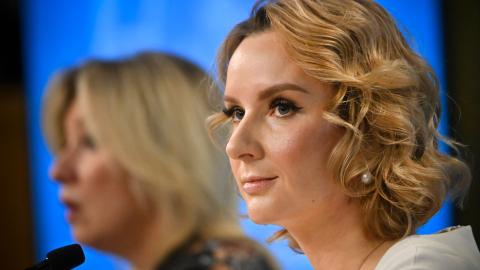Russia shows no intention of returning thousands of deported Ukrainian children and appears unmoved by moral appeals and legal threats from Western nations and international institutions. Who can help bring these children home?
Look to Russian President Vladimir Putin's allies, not his enemies.
On April 1, Russia took over the rotating presidency of the UN Security Council, which is charged with maintaining global peace. At the informal UNSC meeting on April 5, a video message was played with lead speaker Maria Lvova-Belova, Putin's children's rights commissioner who has been accused by the International Criminal Court of being a war criminal.
In the language of Russian propaganda, she tried to justify the unlawful deportation of Ukrainian children. The most shocking perversion of facts came from Russian Permanent Representative to the UN Vasily Nebenzya, who claimed that desperate Ukrainian mothers turn to Russia to help unify their families torn-apart by European states. This was no April fool's joke, but straight from the playbook of Nazi propaganda chief Josef Goebbels: accuse your opponent of the crimes you have committed.
The UNSC could do nothing to prevent or halt Russia's "special military operation" in Ukraine just over a year ago, and indeed, Russia was presiding over the Security Council when Putin decided to invade its neighbor in a grave breach of the UN Charter and international law. Similarly, the ICC-issued warrants of arrest for Putin and Lvova-Belova—which Russia considers "null and void"—have not deterred her and Nebenzya from actually bragging about the deportations, and labeling them as a humanitarian effort to "evacuate" children from a war zone.
Since the beginning of Russia's full-scale invasion of Ukraine, more than 16,000 children have been abducted and placed in institutions or with families in Russia. The deportations serve political and demographic objectives, similar to Soviet population transfers under dictator Josef Stalin. With Russia's birthrate under water and at its lowest rate since 2000, deportations followed by forced cultural assimilation seem to serve a dual purpose for Putin: to boost Russia's demographics and steal the future from the Ukrainian nation.
One thing is clear: The ICC warrants will not bring back thousands of Ukrainian children forcibly taken from their families. In our meeting in Kyiv in January, Oleksandr Kononenko, representative of the Ukrainian ombudsman, stressed that Ukraine's diplomatic channels are limited. With the UN incapacitated, the only realistic chance to advocate for the return of the children is for states with access to the Kremlin to understand their moral duty and intervene. Numerous governments could help. In the Global South, Russia is "winning": two-thirds of those governments either back Moscow or are neutral regarding the invasion of Ukraine, with overall support for Moscow growing.
Other actors, in particular Turkey, Saudi Arabia, and the United Arab Emirates, could help to get these children back. Last year, Ankara brokered an agreement that unblocked grain shipments to alleviate a global crisis along with a major prisoner swap with the involvement of Riyad. Earlier this year, UAE mediation resulted in prisoners of war being released. The successful exchanges and the extended "Black Sea grain deal" mark a dialogue and a platform that could, and should be used to return deported children to Ukraine.
Of course, when it comes to countries that have influence on Russia, China stands out as a potential mediator. Brokering a detente between Saudi Arabia and Iran in March indicates Beijing's readiness and ability to fill the void the United States left behind, playing the global peacemaker's role. European Commission President Ursula von der Leyen and French President Emmanuel Macron's recent trip to China shows that discourse with the Kremlin is only possible via an intermediary. During a joint press conference with Macron, Chinese President Xi Jinping highlighted the need to "protect victims including women and children," but he failed to mention Russia specifically, while underlining the importance of the Russia-China "no-limit partnership." Beijing remains both the European Union's and the U.S.'s systemic rival, but this shouldn't stop anyone from reaching out to Russia's senior partner.
The ICC warrants, and the atrocities upon which they are based, are at the top of the international and U.S. agenda, but we cannot afford to assume the tragedy of Ukraine's deported children will be brought to an end by punitive actions against its perpetrators. In this situation, states that consider Russia a partner against the West and appreciate economic benefits from relationships with Russia, may hold the key to the children's future. Western governments and all who want to bring Ukrainian children home need to reach out to governments with working diplomatic channels with Russia on the basis of a common, and indeed universal concern for the welfare of children, and on the basis of moral reciprocity. Their help is needed, and they would expect no less assistance in restoring their own children, were they likewise to be taken.















